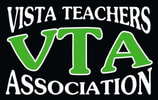VTA/VUSD Contract.
How it Works
At least once every few years, Vista Teachers Association and Vista Unified sit down to negotiate the terms for working in the district. VTA bargaining team sits down as equals with administrators at the bargaining table and both sides start the process with initial proposals.
Once a union contract settlement is reached, it must be ratified by a majority vote of VTA members, and then by the school board. When the contract expires, the process begins again. If a state mediator cannot help break any bargaining impasse that occurs, and a non-binding report from a neutral fact-finder fails to resolve the crisis, only then can teachers strike.
Not everything is negotiable. Critical job issues that are within the legal scope of bargaining include compensation, hours of work, safety matters, class size, evaluation and disciplinary procedures, health care, access to personnel files, preparation time, seniority, transfer rights, a grievance procedure with binding arbitration to settle major disputes, discrimination, job assignments, and early retirement.
Issues not within the scope of bargaining include a district's staffing needs, the district budget process, matters affecting employees outside the bargaining unit, the timing of layoffs, an advisory committee formed by the employer, and access to information unrelated to union representation. ab
How We Enforce Our Contract
Disputes over labor law can be settled by filing an "unfair labor practice" charge with PERB. Disputes over sections of a labor contract can be settled by filing grievances against the school district. Our collective power fuels both of these enforcements.
Bottom Line
Our right to collective bargaining levels the playing field.
At least once every few years, Vista Teachers Association and Vista Unified sit down to negotiate the terms for working in the district. VTA bargaining team sits down as equals with administrators at the bargaining table and both sides start the process with initial proposals.
Once a union contract settlement is reached, it must be ratified by a majority vote of VTA members, and then by the school board. When the contract expires, the process begins again. If a state mediator cannot help break any bargaining impasse that occurs, and a non-binding report from a neutral fact-finder fails to resolve the crisis, only then can teachers strike.
Not everything is negotiable. Critical job issues that are within the legal scope of bargaining include compensation, hours of work, safety matters, class size, evaluation and disciplinary procedures, health care, access to personnel files, preparation time, seniority, transfer rights, a grievance procedure with binding arbitration to settle major disputes, discrimination, job assignments, and early retirement.
Issues not within the scope of bargaining include a district's staffing needs, the district budget process, matters affecting employees outside the bargaining unit, the timing of layoffs, an advisory committee formed by the employer, and access to information unrelated to union representation. ab
How We Enforce Our Contract
Disputes over labor law can be settled by filing an "unfair labor practice" charge with PERB. Disputes over sections of a labor contract can be settled by filing grievances against the school district. Our collective power fuels both of these enforcements.
Bottom Line
Our right to collective bargaining levels the playing field.

